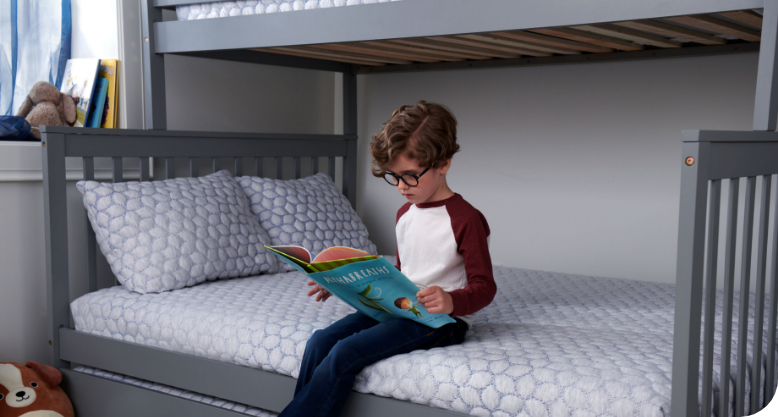How to Reduce Screen Time for Kids in Winter
Cozy blankets, hot cocoa, and holidays are right around the corner! While we're busy decking the halls, one thing might sneak up on us during these winter months: how much screen time our littles are getting. When it's cold and dark outside, tablets, TVs and video games naturally attract more attention.
With winter break coming up, many parents wonder if they should limit screen time and how to reduce it without causing daily battles. Instead of stressing about screen time (because let's be honest, we're all figuring this out together!), let's explore some engaging ways to keep our kiddos entertained this winter.
Why Screen Time Increases During Winter
Screen time creeps up during the winter months. It’s absolutely normal! Between holiday preparations, shorter days and school breaks, we're juggling more than usual while the kids spend more time indoors. When our usual routines shift with the season, screens can become an easy way to keep the kids entertained.
It's okay to rely on screens sometimes – screens are a part of modern parenting. The key isn't to eliminate screen time completely. It's about finding a balance that works for your families during this cozy season.
Should Parents Limit Screen Time for Kids?


Experts suggest we pay more attention to how our littles are interacting with screens, not just how long they're using them. That includes content choices, watching together and open communication about screens.
If you're looking for specific guidelines around screen time, here's what the American Academy of Pediatrics (AAP) recommends:
- Under 18 months: Screen time should be limited to video chats with family
- Between 18-24 months: We can introduce high-quality educational content, but only when we're watching together
- For 2-5-year-olds: An hour a day of quality programming works well
- Ages 6 and up: Aim for no more than two hours daily
The important lesson is creating healthy habits around technology. When we watch together, talk about what we're seeing, and choose content that helps our littles learn and grow, screen time can actually become quality time. Beyond just managing screen time, we're teaching our kids how to build a healthier relationship with technology in general.
How Much Screen Time Is Too Much?
According to the Centers for Disease Control and Prevention (CDC), kids are logging some serious screen hours. Kids ages 8 to 10 are averaging six hours daily while those 11 to 14 are logging a whopping nine hours per day.
Even if your littles don't hit those numbers, there are signs that can help us recognize when screen time might be becoming excessive:
- Changes in sleep patterns or trouble winding down at bedtime
- Meltdowns when it's time to turn off devices
- Less interest in other activities they usually enjoy
- Physical symptoms like headaches or tired eyes
- Difficulty focusing on non-screen activities
Recent research helps us understand why finding that screen time sweet spot matters. Too much time in front of screens can affect a child’s behavior, language development and emotional wellbeing. When young children spend more time with screens than with hands-on play, they might miss out on important developmental skills.
The good news is, winter doesn't have to mean more screen time. There are cozy, creative ways to keep our kids engaged when the weather outside is frightful!
7 Engaging Ways to Reduce Screen Time in Winter
When winter days keep us indoors, finding screen-free activities for kids can feel like a challenge. However, setting thoughtful boundaries and creating engaging alternatives can make it easier to reduce screen time while encouraging healthy habits. Here are seven creative ways to help kids stay active, curious and entertained through the colder months without relying on screens.


1. Set Daily Time Boundaries
Establishing daily screen time boundaries helps children develop a balanced relationship with technology. Instead of rigidly enforcing limits, try involving your kids in the conversation about screen use, discussing why limits are helpful. Keep devices out of sight when it’s not screen time to reinforce this boundary naturally. This proactive approach, combined with shared rule-setting, can make the process smoother and more enjoyable for everyone. Encouraging children to respect screen time limits can reduce conflict and help answer the question: how much screen time is too much?
2. Create a Winter Activities Bucket List
Engaging kids in brainstorming a list of fun, screen-free activities can spark enthusiasm for alternatives to screen time. Letting them choose a mix of sensory activities, from sledding and building snow forts to baking cookies or making hot cocoa, gives them a sense of ownership and excitement. By focusing on their interests, this bucket list serves as a guide for days when reducing screen time is challenging, offering screen-free fun and a reminder that winter holds countless activities beyond the digital world.
3. Organize Indoor Exercise Breaks
Physical activity plays a vital role in reducing screen time and managing energy, especially during cold winter days. Organize short, fun indoor exercise breaks to get kids moving, even when outdoor play isn’t an option. Activities like dance parties, hide-and-seek or a homemade obstacle course can help curb excess screen time and keep your kids active and engaged. This creative approach allows you to limit screen exposure while ensuring kids stay healthy and happy indoors.
4. Make Game Night a Family Tradition
Replacing screen time with a weekly family game night can be a wonderful bonding experience and a fun way to develop essential social skills. Board games and puzzles encourage kids to think strategically, practice patience and enjoy face-to-face interaction. With this regular, screen-free tradition, parents can limit screen time while offering an enjoyable family alternative. It’s a routine that brings everyone together and teaches valuable lessons beyond what screens can offer.
5. Get Crafty with Seasonal Projects
Crafting is an ideal way to reduce screen time while engaging children’s creativity. Simple projects like cotton ball snowmen, salt dough ornaments or paper snowflakes keep hands and minds occupied. These seasonal crafts not only create lasting memories and decorations but also provide meaningful ways to spend time away from screens. Craft projects are versatile, fun and provide an immersive alternative to digital entertainment during the colder months.
6. Plan Storytime or Audiobook Sessions
A cozy reading nook or audiobook session offers a perfect way to reduce screen time while nurturing a love for storytelling. Encourage kids to dive into a world of imagination with classic books or exciting audiobooks. Creating a comfortable reading space with blankets and pillows makes storytime even more special, drawing kids away from screens and immersing them in the joy of storytelling. This alternative to screen-based activities fosters creativity and language skills in a relaxed, enjoyable setting.
7. Explore New Hobbies Together
Winter is an ideal season for kids to explore hobbies and discover new interests outside of screens. Following their interests – whether it's dinosaurs, music or painting – helps screen time limits feel less restrictive. Exploring hobbies together allows parents to reduce screen time without forcing activities, making it a fun journey of discovery. This approach helps children find joy and fulfillment in new pursuits, adding depth and variety to their winter days.


Practical Tips for Parents to Keep Screen Time Under Control
Setting boundaries around screen time is a bit like sleep training. It takes consistency, patience and a whole lot of grace. Some strategies that help include creating visual schedules so our littles know when to expect screen time, choosing screen-free moments (like mealtimes) and finding ways to make non-screen activities just as exciting.
Remember, we're all figuring this out together! Our generation is the first to raise kids in a world where screens are everywhere, and there's no perfect rulebook to follow. Some days we'll nail it with crafts and outdoor adventures. On other days, that TV show buys us the 20 minutes we need to have dinner on the table. And that's okay! The goal isn't to be the "perfect" screen-time parent. It's about finding a balance that works for your family and being gentle with yourself along the way.
Want more winter parenting tips? Check out these helpful posts:

 Baby
Baby

 Kids
Kids

 Learn
Learn

 FIND A STORE
FIND A STORE CONTACT
CONTACT


